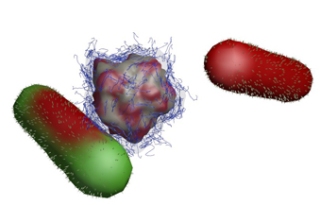A research group at North Carolina State University has developed a novel, eco-friendly method to fight bacteria by developing lignin nanoparticles infused with silver ions and coated with a single polyelectrolyte layer. The latest breakthrough may lead to improved efficiency of antimicrobial products utilized in personal care and agricultural applications.
 Environmentally benign nanobullet (center) attacks bacteria (left) and neutralizes it (right).
Environmentally benign nanobullet (center) attacks bacteria (left) and neutralizes it (right).
Orlin Velev, an engineer at NC State engineer, along with other researchers developed nanoscale particles that introduce silver’s antimicrobial potency to a biocompatible lignin core. Lignin is a substance present in all plant cells. The silver-ion infused lignin nanoparticles, coated with a layer of charged polymer that aids the particles to stick to the target microbes, can effectively destroy a wide range of harmful microorganisms, including E. coli bacteria.
When the targeted bacteria are wiped out by nanoparticles, silver gets depleted from these particles. Upon disposal, the rest of the particles also degrade easily due to their biocompatible lignin core. This greatly restricts the harm posed to the environment.
People have been interested in using silver nanoparticles for antimicrobial purposes, but there are lingering concerns about their environmental impact due to the long-term effects of the used metal nanoparticles released in the environment. We show here an inexpensive and environmentally responsible method to make effective antimicrobials with biomaterial cores.
Velev, INVISTA Professor of Chemical and Biomolecular Engineering at NC State.
The nanoparticles infused with silver ions were utilized to attack Pseudomonas aeruginosa, disease-causing bacteria; E. coli, a bacterial species that cause food poisoning; Staphylococcus epidermis, bacteria that form toxic biofilms on plastics such as catheters in the human body; and Ralstonia, a genus of bacteria that contains various soil-borne pathogens. All these bacteria were destroyed by the newly developed nanoparticles.
Using this latest technique, researchers can easily modify the nanoparticle recipe to target certain microbes. According to Alexander Richter, first author of the paper and a Ph.D. candidate at NC State who received the 2015 Lemelson-MIT prize, the nanoparticles can form the basis for developing pesticide products that reduce risk, have minimal environmental impact, and are priced affordably.
We expect this method to have a broad impact. We may include less of the antimicrobial ingredient without losing effectiveness while at the same time using an inexpensive technique that has a lower environmental burden. We are now working to scale up the process to synthesize the particles under continuous flow conditions.
Other researchers from the University of Hull, EPA, University College London and Wageningen University also took part in the research. The National Science Foundation, the U.S. Environmental Protection Agency, and NC State funded the study.
References